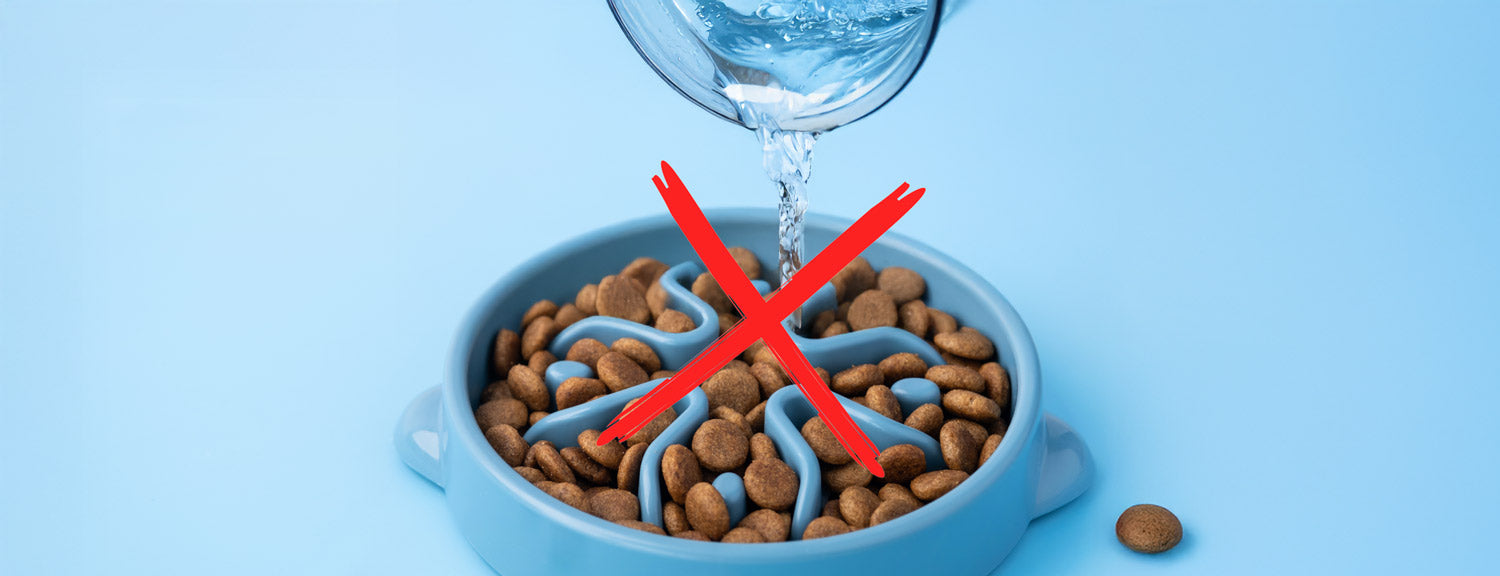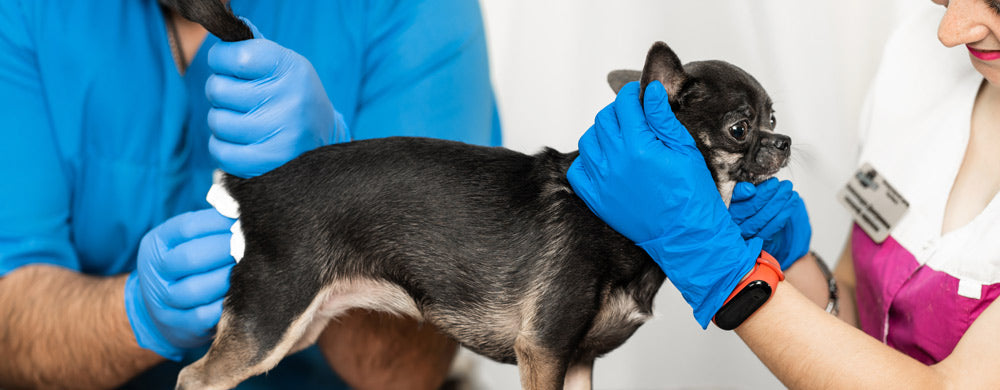Your basket is empty

Multivitamins - Should I Give Them to My Dog?
April 11, 2022 7 min read
While multivitamins for humans can offer a series of benefits for those looking to improve their health and wellbeing, do the same advantages apply to multivitamins for dogs?
Multivitamins can be greatly advantageous for dogs in need of a little boost, particularly if their diet lacks the essential nutrients they need to thrive.
However, not all dogs require multivitamins, so if you’re currently on the fence about adding supplements to your pooch’s diet, here’s everything you need to know about multivitamins for dogs, including benefits, side effects, and risks.
***
What Are Multivitamins?
Multivitamins are a mix of essential vitamins, nutrients, minerals, and fibres. They provide your dog with nutrition that is lacking in their diet and come in a variety of forms, including capsules, powders, liquids, chews, treats, and tablets.
***
What Do Multivitamins Do?
Just like humans, dogs need the right vitamins and minerals in their diets to keep them in tip-top health and shape. Multivitamins have a number of advantages to dogs, such as promoting healthy skin, a shiny coat, strong bones and joints, healthy teeth, and increasing energy levels.
They also allow for better functionality of the immune system to help keep illnesses and diseases at bay.
If your pooch’s diet is lacking in one or more vitamins/minerals, it can have drastic consequences on their health, depending on the vitamin/mineral deficiency.
For instance, a vitamin B9 (folic acid) deficiency can decrease your dog’s antibody response to canine distemper virus and infectious canine hepatitis.
Dogs with vitamin or mineral deficiencies may also suffer from symptoms like depression, diarrhoea, lethargy, weight loss, and loss of appetite.
A good-quality multivitamin provides your pooch with a range of healthy vitamins, minerals, fibres, and nutrients to keep your companion as healthy as can be!
***
Should I Give Multivitamins to My Dog?
If your dog is on a well-balanced, high-quality food, multivitamins aren’t usually necessary as your pooch should be getting everything they need from their diet. In fact, giving your pooch multivitamins when they don’t need them can be more harmful than advantageous.
Dog food manufacturers formulate their products to contain the right levels and proportions of vitamins and minerals, so adding more to your pooch’s diet can upset this balance.
While healthy dogs on a nutritious diet don’t usually need multivitamins, there are some cases when multivitamins can be beneficial or even essential, which we’ll go over below.
Vitamin/Mineral Deficiency
If your pet has been diagnosed with a vitamin or mineral deficiency by a vet, multivitamins can be a good option to give your dog’s health a boost. However, it’s usually better to opt for a specific vitamin supplement to combat a deficiency as it will have a higher concentration of the respective vitamin/mineral.
Health Issue
If your dog has a health issue that responds to supplementation, multivitamins can help relieve symptoms associated with the condition. For instance, vitamin E can decrease inflammation and pain in dogs with osteoarthritis.
Again, similar to dogs with a vitamin/mineral deficiency, it’s best to use a specific supplement to target the condition rather than a multivitamin.
Homemade Diet
Dogs on a homemade diet will need to be given vitamin/mineral supplements to ensure their food is nutritionally complete. Before you put your pet on a homemade diet, it’s a good idea to talk to your vet first for advice and to make sure it’s the best option for your dog.
Poor or Picky Eaters
If your dog doesn’t have a big appetite and or is finicky when it comes to food, they may be at an increased risk of developing a vitamin/mineral deficiency. A multivitamin can be beneficial for preventing health issues and deficiencies.
***
What Vitamins Do Dogs Need?
Dogs need a wide range of vitamins in their diet to keep them at optimal health, including:
- Vitamin A
- B vitamins (folate, niacin, biotin, pantothenic acid, thiamine, riboflavin, vitamin B-6, and vitamin B-12)
- Vitamin C
- Vitamin D
- Vitamin E
- Vitamin K
- Choline
***
Benefits of Multivitamins for Dogs
Multivitamins provide many benefits to dogs if they need a top-up to their vitamin and mineral levels.

- Shiny coat and healthy skin
- Increase absorption rate of nutrients
- Maintain healthy digestion
- Improve cognitive function
- Enhance joint fluidity
- Promote good health of brain liver, heart, brain, and vision
- Boost immunity
Our VITIA multivitamin complex for dogs provides many of the aforementioned benefits, with the bonus being suitable for canines of all ages and sizes. So, no matter how big or old your four-legged friend is, VITIA will give your pooch a little helping paw!
The tablets contain 100% natural ingredients and provide your dog with all the essential nutrients they need in their diet, including calcium and phosphorus for strong bones, linoleic acid powder for a glossy coat, and vitamin C for immune support and faster absorption of nutrients.
***
Should I Give Multivitamins to a Puppy or Senior Dog?
The majority of puppies and seniors don’t need multivitamins unless advised by a veterinarian as commercial dog foods will usually contain the right balance of nutrients for their age.
Make sure you feed your pooch a high-quality food that is suitable for their age as dogs at certain life stages will require different levels of vitamins, minerals, protein, fat, etc.
For example, senior dogs need more protein and less fat in their diets than adult dogs. They can also benefit from vitamin C, E, glucosamine, chondroitin, and long-chain polyunsaturated omega-3 fatty acids to improve cognitive and joint health.
If your senior’s food is lacking in these, multivitamins like VITIA can promote good health and help ward off illness and disease. Speak to your vet before you add a multivitamin or supplement to your pooch’s diet to make sure it’s the right way forward.
Additionally, if your puppy or elderly dog is on a homemade diet, you will need to add a supplement to their food to make sure it contains the appropriate vitamins and minerals.
***
Side Effects of Multivitamins in Dogs
Although multivitamins can be advantageous to dogs if they need a boost to their health, there is a risk of side effects, particularly in large doses. That’s why it’s crucial you stick to the manufacturer's recommended amount and only add supplements to your pet’s diet if they need them.
Signs of multivitamin poisoning in dogs vary depending on the vitamins/minerals used in the product, as well as which vitamin your pet has overdosed on.
Vitamin D poisoning
- Appetite loss
- Vomiting (sometimes mixed with blood)
- Increased thirst
- Increased urine production
- Constipation
- Blood in stool
- Depression
- Weakness
- Abdominal pain
- Muscle tremors
- Drooling
- Seizures
Vitamin A poisoning
- Nausea
- Lameness
- Constipation
- Peeling skin
- Tremors or convulsions
- Feeling of malaise
- Joint or spine stiffness
- Paralysis
- Death
Iron poisoning
Dogs with iron poisoning will appear unwell at first, then seem to improve, the latter of which is a sign of liver failure.
- Fatigue
- Shock
- Fever
- Irritated mucosa
- Rapid heart rate
- Irritability
- Abdominal bloating
- Collapse
If you suspect your dog has overdosed on a multivitamin or supplement, seek veterinary attention immediately. Most cases of vitamin poisoning will require your dog to be hospitalised and have their gastrointestinal system decontaminated.
Once your dog has been allowed to go home, you will need to make sure your pet is given plenty of rest to aid their road to recovery. Provide your pet with a quiet area to sleep with food and water nearby.
If you notice any new symptoms or are concerned at any point, don’t hesitate to contact your vet.
***
What Should I Do If My Dog Ingests Human Multivitamins?
Human multivitamins should never be given to dogs as they contain different concentrations of vitamins, as well as additives that can be toxic to your four-legged friend. Only use multivitamins designed specifically for dogs.
You should always keep multivitamins, medication, cleaning products, and other harmful substances well out of the reach of curious paws, such as inside a locked cabinet or on a tall shelf.

However, if your dog manages to get a hold of multivitamins designed for humans, it’s crucial that you get in touch with your vet as soon as possible.
Try to figure out how many tablets your pooch has eaten and check the ingredients list on the product to see if it contains anything potentially toxic, such as xylitol (more on this below!).
Bring the product to the vet appointment so the veterinarian can see exactly what your dog has consumed - this will help them choose the right treatment method.
Depending on your dog’s weight, the number of multivitamins ingested, the ingredients of the product, and your pooch’s overall health, treatment will vary.
Your pooch may be given the all-clear to go home the same day or they may need to be hospitalised for several days for treatment and supervision.
Xylitol Poisoning
Xylitol is extremely toxic to dogs - even small quantities can be lethal. Unfortunately, human multivitamins, especially the chewable or gummy kind, often contain xylitol.
This substance is also found in many sugar-free foods such as chewing gum, mints, some brands of peanut butter, toothpaste, mouthwash, and sweets.
Symptoms of xylitol poisoning in dogs include:
- Weakness
- Restlessness
- Drowsiness
- Diarrhoea
- Tremors and convulsions
- Blood in stool
- Low blood pressure
- Rapid heartbeat
- Loss of control of bodily movements
- Seizure and collapse due to hypoglycaemia
If you believe your dog has ingested something containing xylitol, it’s important to act fast. Take them to a vet immediately. Never induce vomiting or give your dog something orally unless a veterinarian has advised you to do so.
***
Final Thoughts
Dogs with diagnosed vitamin/mineral deficiencies and those with poor-quality diets, health issues such as osteoarthritis, or in need of immune support can benefit massively from a multivitamin like VITIA.
Your four-legged friend requires a wide variety of vitamins and minerals in their diet to keep them in tip-top shape, so it’s important that you feed them a high-quality diet and supplement if necessary.
As always, contact your vet before you add a multivitamin to your pet’s diet and remember to adhere to the manufacturer’s recommended dosage!
Also in Pet Advice

Should You Add Water to Your Dog’s Kibble? Here’s What the Science Says
August 14, 2025 7 min read
Should you add water to your dog’s kibble? Discover the science-backed pros, cons, and better alternatives like bone broth and fresh food to improve hydration, digestion, and overall canine health...

DIY Frozen Dog Treats Your Pup Will Love
June 27, 2025 4 min read
Summer heat can be dangerous for dogs, making hydration more important than ever. Learn how to spot signs of dehydration, boost your pup’s water intake, and create fun, frozen recipes to keep them happy and healthy all season long.

Why Is My Dog Scooting? Common Causes and How Diet Can Help
May 09, 2025 4 min read
If your dog is scooting or smells fishy, it could be due to blocked or irritated anal glands. Learn what causes blocked anal glands, which dogs are most at risk, and how simple dietary changes—like adding fibre and anti-inflammatory nutrients—can help prevent recurring problems.
Search our shop
In this article
- What Are Multivitamins?
- What Do Multivitamins Do?
- Should I Give Multivitamins to My Dog?
- What Vitamins Do Dogs Need?
- Benefits of Multivitamins for Dogs
- Should I Give Multivitamins to a Puppy or Senior Dog?
- Side Effects of Multivitamins in Dogs
- What Should I Do If My Dog Ingests Human Multivitamins?
- Xylitol Poisoning
- Final Thoughts
